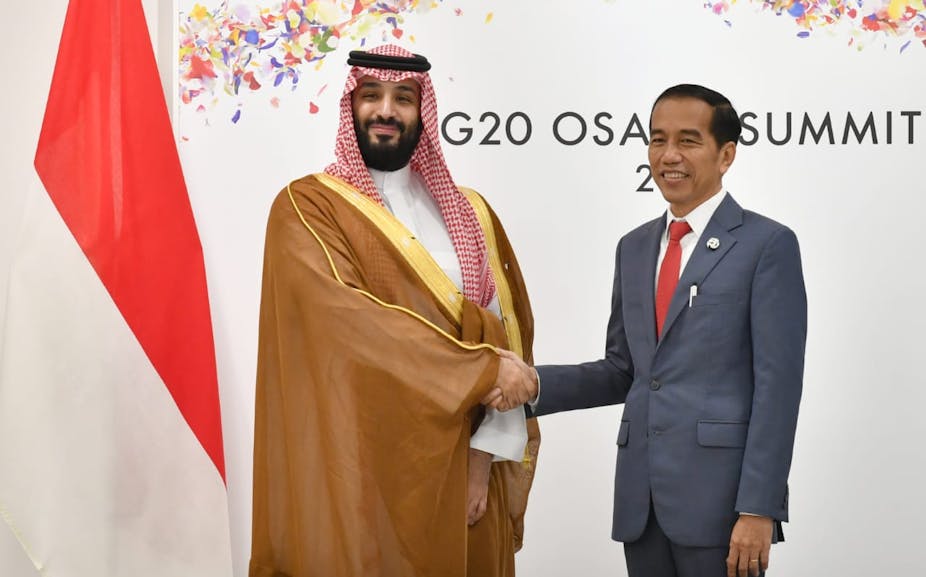The ongoing tension between the United States and China should encourage Indonesia to find ways to reduce reliance on the two great powers. It can start by looking to strengthen political and security ties with non-traditional partners.
Tensions with the US have led to China growing increasingly assertive in Southeast Asia and distrust of the US as a security partner is on the rise. Economic ties between the Chinese and American economies may be in decline, which could mean higher US tariffs on China, and vice versa.
As some have argued, growing protectionism in the two countries would also disrupt broader Southeast Asian access to the US market.
A decoupling of China and US relations could also lead to different trading blocs; one led by China and another led by the US.
This prospect could complicate life for Indonesian companies when conducting business with or investing in China and the US. They will need to take political factors into consideration.
The Gulf could serve as a gateway for Indonesia to move away from the orbits of China and the US. It also provides a potentially lucrative market and investment partner.
In this relationship, the Gulf is represented by the Gulf Cooperation Council (GCC) — an intergovernmental political and economic union made up of Bahrain, Kuwait, Oman, Qatar, Saudi Arabia, and the United Arab Emirates.
Here are four areas that can support cooperation between Indonesia and the GCC.
1. Trade and investment is good — but can be better
The GCC and Indonesia already have quite a good investment relationship, and it’s improved further in recent years.
Trade between Indonesia and the Gulf States increased by 40% from US$ 8.68 billion in 2016 to $12.15 billion in 2018. Indonesian imports from the Gulf countries are worth more than $7.6 million per year, with Saudi Arabia ranked 12th among Indonesia’s global trading partners.
Investment has also grown — by 26% from $60.3 million in 2016 to $76.1 million in 2018. Although the number remains small, the two countries have increased their two-way investments.
Increasing cooperation in the economic sector, however, is not enough.
The Gulf is rich in oil and gas; Indonesia, too, has a wealth of natural resources.
There is an opportunity for both of parties to cooperate further when it comes to natural resource development, especially in the oil and gas sector.
In 2019, Indonesia’s imports of fossil fuels from the GCC reached $2.4 million. Saudi Arabia, the UAE, and Qatar were among the ten biggest sources of oil imports for Indonesia.
In the same year, imports of coal from Indonesia to the GCC was worth $18,922, making Indonesia the fifth largest exporter of coal to the Gulf.
2. Multilateralism presents opportunities
Multilateralism, which is more coordinated interaction between states, can help increase efficiency and produce more coordinated global networks.
By working together, both parties contribute to strengthening the world trading system and multilateralism in general.
In this case, Indonesia and the Gulf are already eyeing cooperation. Indonesia encouraged the formation of the GCC Comprehensive Economic Partnership Agreement (CEPA), which will help facilitate better outcomes for both economies, especially for Saudi Arabia, which a key partner for Indonesia.
Indonesia supported and welcomed the 2020 presidency of Saudi Arabia at the G20 — an international forum for the governments and central bank governors of 19 countries and the European Union.
At the same time, it has supported Saudi Arabia’s efforts to encourage key G20 member countries to discuss global economic challenges and opportunities.

3. Solidarity in and after the pandemic
On the pandemic mitigation front, the UAE wants to give Indonesia 10 million doses COVID-19 vaccine (other sources say it’s 30 million doses).
The vaccines are from China, and this kind of pandemic mitigation effort forms a new front in the cooperative relationship between Indonesia, the UAE and China.
Indonesia’s desire to work with Saudi Arabia to deepen cooperation on health issues can help tackle COVID-19.
Indonesia also wants to send health workers, equipment and medicines to Saudi Arabia.
Indonesia and the UAE are also collaborating to manufacture laser-based and artificial intelligence-based COVID-19 detectors.
Indonesia last year sought to expedite internal processes in the GGC to accelerate economic partnership agreements with the Gulf countries.
The CEPA could support two-way trade and investment, improve market access, and promote inclusive economic growth in Indonesia and the GCC for the mutual benefit of both countries.
Although this effort might be affected by the pandemic, it will certainly continue in future and help return economic activity to normal.
4. Cultural and people-to-people contacts
Mutually beneficial socio-cultural cooperation can encourage better economic and political relations.
As Muslim-majority countries, Indonesia and the Gulf states share a similar religious background which can help facilitate communication and cooperation.
Education can be place to start, with young generation exchanging knowledge and deepening connections.
Such cooperation could help overcome linguistic-cultural barriers and increase the number of professionals who are acquainted with each other’s societal norms, customs, methods of performing business, as well as national and institutional interests.
Tourism is another area to develop. This sector could set an example of how cultural and people-to-people connection can be a driver for economic development between the two parties.
Fuad Tingai, a Universitas Islam Indonesia student, contributed to this article.


